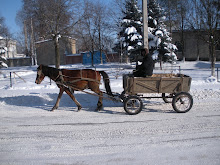Humanity rather let me down a couple times this week, and a grumpy disposition was attempting to cut in on my usual, cheery demeanor, just when my host Mom came through the door and said, “Let’s make food! You put the water on to boil, and I’ll get the meat.”
Someday I’ll get the “Honey! I’m hooome!” kind-of caller, but for today, Maria and Fedorița were exactly what I needed. With grumpiness defeated in the end, I thought I’d relay a few of the topics that graced our typical dinner table tonight—mostly just a whole lot of humble pie with a side of comfort (in knowing our place in this little community of ours) and concern (for what is to come of said community).
Dinner conversations:
[+] The astonishingly ridiculous idea that someone needed to rip out the heating system at Maria’s office, in the middle of winter, to build a wood/coal burning stove instead. Thus, leaving all the employees without heat, a custodial worker—because all the construction dust made her sick and she landed in the hospital--or the employee’s salaries for the last two months of work.
[+] The sad financial state of the state-owned bread factory where Maria is an accountant. Politics play a HUGE role here, but the latest analysis by the head of accounting at the firm says it’s going kaput no matter which party looks at it. The only way she sees the factory getting itself out of this morass is to close-up shop.
[+] Which neighbor is sick and what pills Maria gave her to try.
[+] Why I so thoroughly enjoyed teaching a course on local fundraising in Chisinau, yesterday a)people seemed to appreciate it, b) people were generally excited about it, rather than skeptical about its ability to produce “big” enough results *hint, not all assets are monetary*
[+] The email from Gregg, the first Peace Corps Volunteer to live with my host family. He is coming for a visit soon. Maria had tears in her eyes she was so happy.
[+] How I’m going to spend the last few months at my site, working with the youth council….or more correctly, how I need to dedicate serious thought to it before it slips away.
[+] The American idiom “He is talking just to hear his own voice.” Sorry, for my safety, I probably should not tell you who we directed one towards. Also, the Moldovan idiom, “That’s life!”
[+] The neighbor Fedorița walked home with today. Fedorița thought the walk would never end because the woman never stopped gossiping the whole way. Yes, “radio baba" is rather noisy.
Readers, serve up some of the outside dishes please! What did you and your families talk about at the last dinner table?



































